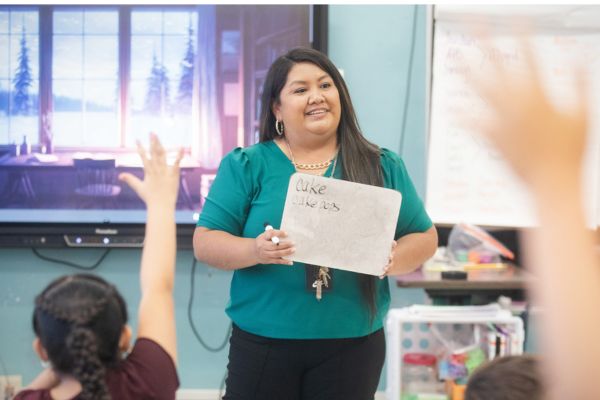
- Details
- By Neely Bardwell
Honored is a national nonprofit that works to keep exceptional teachers in the classroom and inspire a new generation of talent to pursue teaching. Each month from September through May, Honored selects one teacher to receive the Honored Transformative Teacher Award, which comes with a $5,000 prize. Teachers are nominated by current or former students and parents or family members of students. Honorees are selected for their impact on the nominated student’s life.
Pahvahtyah is Hopi and Tewa and grew up on her tribal lands. She has been teaching for four years and currently teaches fourth-grade students.
“I know as children we have dreams of what we want to be when we grow up, and teaching was one concept that never crossed my mind,” Pahvatyah told Native News Online. “As I started going through my educational journey, I found that impacting change was something that I was passionate about. I also found that creating spaces for self-advocacy was also another area that I found passion in.”
Pahvatyah’s original plan was to be a lawyer. It wasn’t until she had to leave school and move home to care for her mom, who was battling cancer, that she realized she wanted to teach.
While she was home, Pahvatyah saw that there were very limited options for employment that provided the benefits needed to support a family. So, she branched out and took an interview as a teacher’s assistant.
“In that process, I found that the youth are key to enlightening generational change,” Pahvatyah said. “I think that for me, that was something I saw in my community that really inspired me to become a teacher.”
Now that Pahvatyah is a teacher in her own classroom, she utilizes the values of her Hopi culture to help her students celebrate their own unique identities.
“Even though I am a Native American teacher within a public school setting where I don’t have any Hopi or Tewa students, I still incorporate the values of what made me who I am,” Pahvatyah said. “My values, my ways of knowing my people, and it’s their ways of being that have made me who I am.
Pahvatyah looks at her students as her children. She uses expectations for her students that are from her Hopi language, such as ‘kyats,’ the Hopi word for respect. She also teaches her students the importance of contributing to a whole community for the benefit of everyone instead of for individual rewards.
Pahvatyah also sets an expectation of acting with integrity by creating an environment where students are encouraged to take the initiative to accomplish a task without having to be asked or reminded to do so. These can be translated back into Pahvatyah’s Hopi and Tewa languages.
It is these things, she explains, that sets her classroom apart.
“It’s [the classroom] cultivated around those three concepts of respect, integrity and humble-ism,” Pahvatyah said. “And now, even though they don’t speak my language, they understand because it really helps create this classroom community that is not just in this assimilatory space, but it creates this family.”
She explained that one example of how she cultivates a space of learning, respect, integrity, and humble-ism is by having all students respect her last name and how it is pronounced. By recognizing that many BIPOC names are often “white-washed,” she believes that by teaching them to respect her name, they will respect other students’ names.
Pahvahtyah was nominated for the Honored Award by two of her students, Gabby and Lili Borquez.
Ninety-four percent of Honored Teachers report feeling more enthusiastic about teaching and 88 percent of them share that receiving this recognition is likely to keep them in the classroom for five more years.
“I truly am humbled by this accomplishment, and it has indeed been a new journey for me to explore,” Pahvahtyah said. “I appreciate sharing this with our youth, especially our indigenous youth and communities, and with the world. But as I set out in my career, I never had the intention of doing it for awards or celebrations, but the intention to make a difference and an impact.
As happy as I am to receive and embrace this accomplishment, I am also humbled by the notion that by getting there, I can say that I have stayed true to my intentions of making that difference and making that impact.”
More Stories Like This
Bard College Center for Indigenous Studies (CfIS) Hosts Annual Symposium With Keynote Speaker Miranda Belarde-Lewis on March 9–10American Indian College Fund Announces Spring 2026 Faculty Fellow Cohort
Navajo Nation Signs $19 Million Diné Higher Education Grant Fund Act into Law
Dr. Shelly C. Lowe to Be Inaugurated as IAIA President March 26–27
Tlingit Language Courses Expand for Students to Learn With Families At-Home
Help us defend tribal sovereignty.
At Native News Online, our mission is rooted in telling the stories that strengthen sovereignty and uplift Indigenous voices — not just at year’s end, but every single day.
Because of your generosity last year, we were able to keep our reporters on the ground in tribal communities, at national gatherings and in the halls of Congress — covering the issues that matter most to Indian Country: sovereignty, culture, education, health and economic opportunity.
That support sustained us through a tough year in 2025. Now, as we look to the year ahead, we need your help right now to ensure warrior journalism remains strong — reporting that defends tribal sovereignty, amplifies Native truth, and holds power accountable.
 The stakes couldn't be higher. Your support keeps Native voices heard, Native stories told and Native sovereignty defended.
The stakes couldn't be higher. Your support keeps Native voices heard, Native stories told and Native sovereignty defended.
Stand with Warrior Journalism today.
Levi Rickert (Potawatomi), Editor & Publisher


